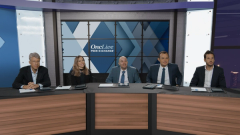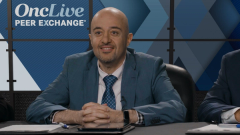
MDS/MPN-RS-T Overlap Syndromes
A brief discussion centered on MDS/MPN-RS-T overlap syndromes, considerations for diagnosis, available treatment options, and updates in the space.
Episodes in this series

Transcript:
Rami Komrokji, MD: There’s this unique entity of MDS [myelodysplastic syndrome]/MPN [myeloproliferative neoplasm] ring sideroblasts with thrombocytosis [RS-T] in which the label approval for luspatercept allows that group to be treated with luspatercept. Can you tell us a little more about this unique type of MDS?Then we can talk about the treatment a little.
Sanam Loghavi, MD: Yes, of course. This is 1 of the diseases that read the books. It’s a perfect phenotypic manifestation of its underlying biology and the molecular alterations. For that reason, I’m going to point out that the fifth edition of the WHO [World Health Organization Classification of Haematolymphoid Tumours] renamed this entity as MDS/MPN with SF3B1 mutation and thrombocytosis. Essentially, patients present with anemia and thrombocytosis, which is a manifestation of the SF3B1 mutation. It most frequently has cooccurrence with JAK2, but it can occur with MPL as well. These patients have an overlap syndrome between MDS and MPN. The morphology of the bone marrow is often increased ring sideroblasts, with very bad erythroid dysplasia, and the megakaryocytes look like MPN megakaryocytes. You have the hyperlobulated clustering as a manifestation of the MPN driver mutations.
Rami Komrokji, MD: In our experience, many of those patients are labeled as essential thrombocythemia [ET]. If they present with that proliferative phenotype, they’re treated as ET. But then anemia happens. They think it’s from the Hydrea, but you review those bone marrows and it’s MDS/MPN RS-T. They have a favorable outcome. How do you treat those? What are the options?
Guillermo Garcia-Manero, MD: This is interesting because of course you’ve mentioned that they can be treated with a luspatercept. But you were the first to report that they have extreme sensitivity to lenalidomide. This is something we’d consider. They don’t have a del(5q) alteration, but this subset of patients does well with lenalidomide. First, the natural history study was longer than other subsets. My recommendation would be that you use lenalidomide, erythroid growth factors, and transition to hypomethylating agents. We have luspatercept. You’re going to see this evolution.
Something that also unfortunately happens—I don’t know if this is just my experience—is that when patients go to blast phase, it’s difficult to control. We’ve seen the same thing with chronic neutrophilic leukemia. It’s not the same disease, but they’re related; they’re pH negative. Sometimes the patient has this benign behavior and then they explode. When they transform, I don’t know that it’s so easy. But they do very well with lenalidomide. They can respond to hypomethylating agents and growth factors, and they can be on therapy for quite a bit of time.
Rami Komrokji, MD: It depends. Some of them behave like ET, so all you need is Hydrea. They become anemic, and anemia has been universally shown to be a poor prognostic factor in this subtype. All those patients will be lower-risk disease by the IPSS [International Prognostic Scoring System] or the revised IPSS. They have a good chance of responding to an ESA [erythropoiesis-stimulating agent]. The response to lenalidomide is between the del(5) and the non-del(5), but 30% or 40% responses are durable. We published together from the MEDALIST trial the subset of patients included had very high response rates to luspatercept. The real-world data confirm the same. They do a little worse with hypomethylating agents. They don’t respond as high to hypomethylating agents.
Transcript edited for clarity.








































